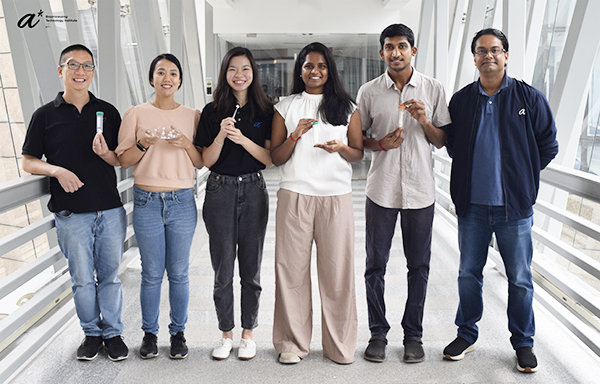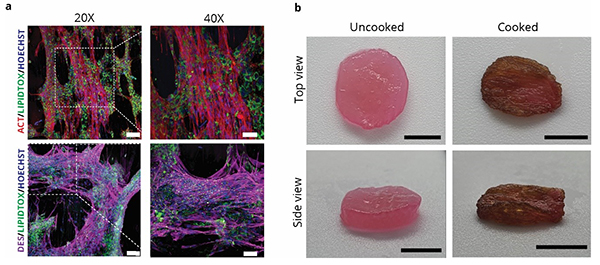Edible Plant-based Scaffold for Cultivated Meat Manufacturing

Science
Cultivated meat (CM) represents a sustainable and ethical shift from traditional animal agriculture by growing meat directly from cells in a controlled setting. This innovation aims to reduce environmental impact and address animal welfare concerns associated with conventional meat production. However, a key challenge has been replicating the complex structure and texture of traditional meat using sustainable and animal-free materials.
Our research focuses on developing edible scaffolds derived from plants, such as decellularised asparagus scaffold, which can provide essential support for growing muscle and fat tissues from animal cells. By using these scaffolds, we aim to create CM that not only mimics the taste and texture of conventional meat but also reduces the environmental impact and ethical concerns associated with livestock farming. Our findings demonstrate that these decellularised plant-based scaffolds can support the growth and differentiation of muscle and fat cells, showing potential for advancing the biomanufacturing of CM products that are sustainable and aligned with consumer texture expectations.
Societal Impact
Our research on plant-based scaffolds for CM production brings significant societal and economic benefits. By transitioning from traditional animal farming to CM, we can reduce environmental impacts such as greenhouse gas emissions and land use, while also addressing ethical concerns related to animal welfare. Economically, using edible plant scaffolds along with the valorisation from agriculture waste could potentially reduce production costs compared to synthetic or animal-derived scaffolds, making CM more affordable for consumers. Additionally, this technology promotes innovation in sustainable food production, aligning with United Nations Sustainable Development Goals.
Technical Summary
This study investigates the efficacy of decellularised plant scaffolds (DPS) derived specifically from asparagus, featuring aligned vascular bundles, for cultivating muscle tissue from murine myoblasts (C2C12) and porcine adipose-derived mesenchymal stem cells (pADMSCs) [1]. Characterisation of the scaffold involved assessing its capacity for cell attachment, proliferation, and differentiation into muscle tissue, utilising muscle markers such as Myosin heavy chain (MHC), Myogenin (MYOG), and Desmin through immunofluorescence and qPCR analyses. Results demonstrated significant increases in muscle-specific markers and metabolic activity, indicating successful muscle differentiation on DPS.
Moreover, a co-culture model was implemented using pADMSCs to facilitate the development of muscle and adipose tissue on the same scaffold, confirmed by immunofluorescence staining for muscle markers and LipidTOX staining for lipid accumulation in adipocytes. Texture profile analysis revealed that uncooked CM prototypes exhibited similar textural properties to pork loin, while pan-fried CM prototypes showed variations in hardness and chewiness. These findings underscore the potential of DPS as a promising, edible scaffold for advancing the biomanufacturing of CM enhancing both sensory attributes and scalability of CM products.

(a) Immunofluorescence imaging of LipidTOX staining of fat cells (green) with muscle markers – Desmin, DES (far-red); Actin, ACT (red) and nucleus (blue) 20X (scale bar = 100 µm) and 40X magnification (scale bar = 50 µm). (b) Representative images of uncooked and pan-fried samples (scale bar = 5 mm).
References
Murugan, P., Yap, W.S., Ezhilarasu, H. et al. Decellularised plant scaffolds facilitate porcine skeletal muscle tissue engineering for cultivated meat biomanufacturing. npj Sci Food 8, 25 (2024). https://doi.org/10.1038/s41538-024-00262-1
A*STAR celebrates International Women's Day

From groundbreaking discoveries to cutting-edge research, our researchers are empowering the next generation of female science, technology, engineering and mathematics (STEM) leaders.
Get inspired by our #WomeninSTEM
.png?sfvrsn=1a7df424_3)